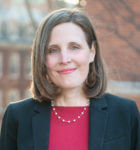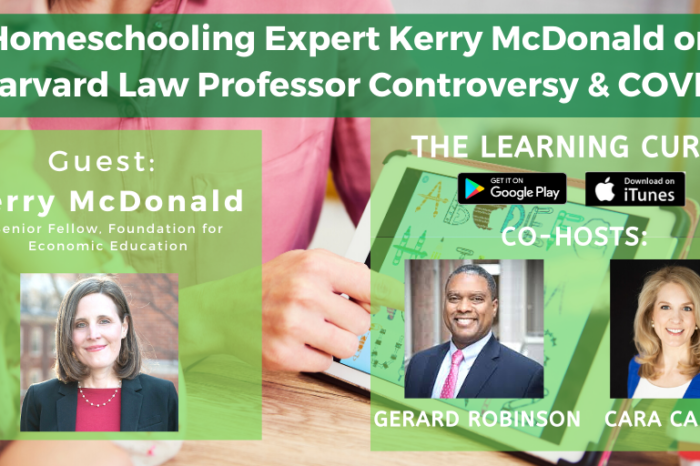Homeschooling Expert Kerry McDonald on Harvard Law Professor Controversy & COVID
This week on “The Learning Curve,” Cara and Gerard are happy to be joined by Kerry McDonald, a Senior Fellow at the Foundation for Economic Education and author of Unschooled: Raising Curious, Well-Educated Children Outside the Conventional Classroom. Drawing on her experiences as a homeschooling parent and researcher, Kerry shares thoughts on the major lessons we all should be learning from this educational moment, now that COVID has turned most of America’s 50 million schoolchildren and their families into “homeschoolers.”
Kerry reviews which education choice mechanisms, such as education savings accounts, would most effectively support homeschooling, and which states have policies that encourage entrepreneurship and innovative K-12 models, such as microschools and virtual charter schools.
They also explore the increasing diversity of the two million children in the U.S. who were homeschooled before the pandemic, changing public perceptions, and a Harvard Law School professor’s controversial call for a presumptive ban.
Get Updates on Our Education Research
Stories of the Week: Over 100 Catholic schools across the country are permanently closing as a result of the financial losses associated with COVID, impacting an estimated 50,000 mostly low-income and working-class students. How will the closures affect cash-strapped district schools facing an influx of these new students? Kudos to Kelley Brown, a history teacher from Easthampton, Massachusetts, who led her high school history students to win the national “We the People” civics competition. The achievement – a first for the Bay State – was all the more impressive considering the contest was held in the midst of a global pandemic and conducted entirely via Zoom, requiring extraordinary coordination.
The next episode will air on May 29th, 2020 with guest, Dana Gioia, a poet, writer, and the former Chairman of the National Endowment for the Arts.
Newsmaker Interview Guest:
 Kerry McDonald is a Senior Education Fellow at FEE and author of Unschooled: Raising Curious, Well-Educated Children Outside the Conventional Classroom (Chicago Review Press, 2019). She is also an adjunct scholar at The Cato Institute and a regular Forbes contributor. Kerry’s research interests include homeschooling and alternatives to school, self-directed learning, education entrepreneurship, parent empowerment, school choice, and family and child policy. Her articles have appeared at The Wall Street Journal, Newsweek, NPR, Education Next, Reason Magazine, City Journal, and Entrepreneur, among others. She has a master’s degree in education policy from Harvard University and a bachelor’s degree in economics from Bowdoin College. Kerry lives in Cambridge, Massachusetts with her husband and four children. Kerry tweets at: @kerry_edu.
Kerry McDonald is a Senior Education Fellow at FEE and author of Unschooled: Raising Curious, Well-Educated Children Outside the Conventional Classroom (Chicago Review Press, 2019). She is also an adjunct scholar at The Cato Institute and a regular Forbes contributor. Kerry’s research interests include homeschooling and alternatives to school, self-directed learning, education entrepreneurship, parent empowerment, school choice, and family and child policy. Her articles have appeared at The Wall Street Journal, Newsweek, NPR, Education Next, Reason Magazine, City Journal, and Entrepreneur, among others. She has a master’s degree in education policy from Harvard University and a bachelor’s degree in economics from Bowdoin College. Kerry lives in Cambridge, Massachusetts with her husband and four children. Kerry tweets at: @kerry_edu.
Newslinks:
At Least 100 Catholic Schools Across The Country May Not Reopen This Fall
Easthampton High School (MA) wins national ‘We the People’ competition; best performance ever by a Massachusetts team
Tweet of the Week
State governors are speaking out about the coming school year that will be unlike any other https://t.co/pUcxaLO5kX
— POLITICO (@politico) May 18, 2020
Recent episodes















